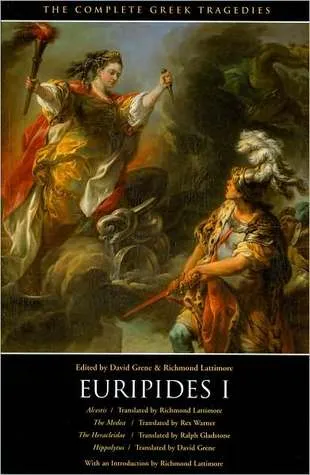Euripides I: Alcestis / The Medea / The Heracleidae / Hippolytus

Unveiling the Theatrical Tapestry: Journeying through "Euripides I" by Various Translators
Introduction: A Dive into Ancient Drama
"Euripides I" offers a captivating plunge into the world of Greek tragedy, featuring plays like "Alcestis," "The Medea," "The Heracleidae," and "Hippolytus." With translations by Ralph Gladstone, Rex Warner, David Grene, and Richmond Lattimore, the collection beckons readers to explore the timeless narratives of Euripides.
Personal Prelude: An Affair with Ancient Narratives
Before immersing myself in the plays, I reflected on my enduring affair with ancient narratives. The allure of Greek drama, with its rich tapestry of human emotions and societal reflections, had been a constant companion in my literary journey. "Euripides I" promised another chapter in this ongoing relationship.
Alcestis: Love, Sacrifice, and Redemption
The collection opens with "Alcestis," a tale of profound love, sacrifice, and ultimate redemption. Alcestis willingly offers her life for her husband, Admetus, setting the stage for exploration into themes of devotion, mortality, and the complexities of human relationships.
Personal Connection: Acts of Sacrificial Love
Thinking about acts of sacrificial love, I recalled personal experiences where individuals went to great lengths for the well-being of their loved ones. The narrative of "Alcestis" became a poignant reminder of the profound sacrifices woven into the fabric of human connections.
The Medea: A Tragic Exploration of Revenge
Moving on to "The Medea," Euripides delves into the darker side of human emotions, portraying the tragic consequences of revenge. The character of Medea becomes a formidable force, challenging societal norms and exploring the boundaries of vengeance.
Personal Anecdote: Navigating the Abyss of Revenge
Reflecting on navigating the abyss of revenge, I thought about moments when the desire for retribution tested the limits of reason. "The Medea" resonated with the idea that the pursuit of revenge, while driven by intense emotions, often leads to a harrowing descent into tragedy.
The Heracleidae: A Saga of Exile and Return
"The Heracleidae" shifts the focus to a saga of exile and return, exploring the challenges faced by the descendants of Heracles. The play unfolds against a backdrop of political intrigue, exile, and the quest for justice.
Personal Reflection: Themes of Exile and Homecoming
Contemplating themes of exile and homecoming, I thought about the universal human yearning for a place to belong. "The Heracleidae" mirrored the complex emotions tied to the concepts of home and displacement, echoing sentiments that transcend cultural and temporal boundaries.
Hippolytus: Love, Tragedy, and Divine Wrath
The collection concludes with "Hippolytus," a tragedy that navigates the intricate web of love, betrayal, and divine wrath. The play unfolds as a riveting exploration of the consequences of forbidden desires and the capricious nature of the gods.
Personal Anecdote: Navigating Forbidden Territories
Recalling personal experiences of navigating forbidden territories, I thought about instances where desires clashed with societal norms. "Hippolytus" became a narrative prism through which to examine the complexities of human passions and the ensuing tragedies.
Translation Dynamics: The Artistry of Various Translators
A notable aspect of "Euripides I" is the diverse group of translators, each infusing their unique artistry into the plays. Ralph Gladstone, Rex Warner, David Grene, and Richmond Lattimore contribute to the collection, showcasing the richness and flexibility of Euripides' language.
Personal Connection: The Translator's Craft
Thinking about the translator's craft, I recalled moments when a well-crafted translation illuminated the nuances of a foreign narrative. The collaboration of multiple translators in "Euripides I" highlighted the dynamic nature of language and the interpretive dance between cultures.
Relevance Today: Echoes of Ancient Wisdom
Despite being rooted in ancient Greece, the themes explored by Euripides in "Euripides I" retain a striking relevance in today's world. The plays resonate with universal truths about love, sacrifice, revenge, exile, and the unpredictable forces that shape human destinies.
Personal Reflection: Lessons Across Millennia
Reflecting on lessons across millennia, I thought about how the plays' enduring relevance serves as a testament to the constancy of human nature. The wisdom embedded in the narratives transcends temporal and cultural boundaries, offering insights that continue to echo in contemporary lives.
Conclusion: The Ongoing Theatrical Odyssey
As I concluded my journey through "Euripides I," I marveled at the enduring power of ancient drama to illuminate the human experience. The collection stands as a testament to the timelessness of Euripides' narratives and their ability to resonate across ages.
A Grateful Pause
Closing the book, I felt grateful for the opportunity to engage with the theatrical legacy of Euripides through the lens of various translators. "Euripides I" serves as a reminder that, in the vast expanse of literary exploration, the echoes of ancient voices continue to reverberate.